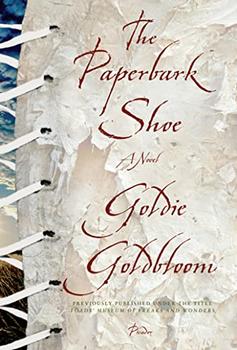Summary | Excerpt | Reading Guide | Reviews | Beyond the Book | Readalikes | Genres & Themes | Author Bio

A Novel
by Goldie GoldbloomExcerpt
The Paperbark Shoe
I was hiding in the orchard, pretending to check for creepy-crawlies rutting on the beginnings of the fruit when the Italian prisoners of war arrived, descending from the sergeant's green Chevy: one fella tiny, nervous, prancing sideways, shaking his glossy black mane, a racehorse of a man, sixteen if he was a day; the other bloke a walking pie safe, draped in a freakish magenta army uniform, complete with a pink blur in the buttonhole that I reckoned was an everlasting. Some prisoners. They looked more like two obscure French artists mincing along behind the curator of a museum of primitive art. The curator, my husband Toad, pointed to the house, and I imagined him saying, 'And over here is the Toady masterpiece - The Farm House - painted in a mad rush in 1935 before the wife had her first child - notice the delightfully eccentric stone chimney, the listing veranda, the sunburnt children lurking under the mulberry.' And the tame cockatoo, Boss Cockie, saw them coming and raised his crest in alarm and muttered under his breath. 'Shut up,' he said. 'Go away. Bad bloody cockie.'
I turned thirty the year the Italians came to our West Australian farm, and I was afraid of them, so afraid of those over-sexed men we'd read about, rapists in tight little bodies with hot Latin eyes, men who were capable of anything. Of course, we didn't know much about them, just what we'd heard on the wireless or read in the paper, and if Mr Churchill had said donkeys were flying in Italy, I do think we'd have believed him. We women of the district, none of us wanted the Italians, but who were we to say? It was impossible to get help for ploughing and seeding and shearing, the young bloods gone to splatter themselves all over Europe, New Guinea, North Africa, and even the old retreads in the Volunteer Defence Corps were busy drilling on the football oval. They didn't know that their crushed paper bag faces were enough to repel any Japanese invasion. Men were rationed, like everything else, and so when the government offered prisoners of war as farm labour, the control centres were mobbed from the first day by farmers in search of workers.
Oh, I knew those dagoes were coming all right, and that's why I hid in the orchard, crouching there in Wellington boots, the hem of my dress bunched in one hand. Over sixty trees were in bloom, and I was busy brushing petals out of the valley of fabric between my knees, trying to breathe, because the scent of orange blossom was chokingly sweet. And the rabbits - the bloody rabbits - had ringbarked all the newly planted almond slips, their buds already wilting.
I didn't want to put those men in Joan's old room. I didn't want them in my house at all. But we couldn't keep them in the shearing shed like a mob of sheep, so I was forced to scrub her tiny room - really just a closed-in part of the veranda, a sleepout - and beeswax the jarrah boards, and spread the old hospital beds with sheets white and brittle as bones. And, as a final touch, a welcoming note that I didn't feel, I stuffed some golden wattle in a canning jar and put it on a box between their beds. I'd cleaned the whole house too, so that if the prisoners killed us while we were sleeping, the neighbours wouldn't have anything to talk about, and I'd sent my children, Mudsey and Alf, to pick up the wee droppings that their poddy lamb had left all over the veranda. And lamb chops were on my mind, with mint sauce, baby potatoes and - on the side - a fricassee of brains.
I had a fairly good idea why Toad wasn't taking the Italians over to the room, and even though I knew it was wrong, even though what he was planning to do to them was possibly a breach of the Geneva Convention, I waited, gurgling with delight in the lusty orchard, attacked by platoons of bees drunk on orange blossom wine. All my senses were walking with the men, waiting for the sound of those baby-eaters howling when they were shoved into the sheep dip. They'd bellyflop into the stinking, arsenic-laden waters and they'd wonder about the greasy black pellets floating past them like mines and they'd be picking some of the sheep shit from their eyebrows right when Toady pushed them under again with his crook.
Excerpted from The Paperbark Shoe by Goldie Goldbloom. Copyright © 2011 by Goldie Goldbloom. Excerpted by permission of Picador. All rights reserved. No part of this excerpt may be reproduced or reprinted without permission in writing from the publisher.




A million monkeys...
Click Here to find out who said this, as well as discovering other famous literary quotes!
Your guide toexceptional books
BookBrowse seeks out and recommends the best in contemporary fiction and nonfiction—books that not only engage and entertain but also deepen our understanding of ourselves and the world around us.